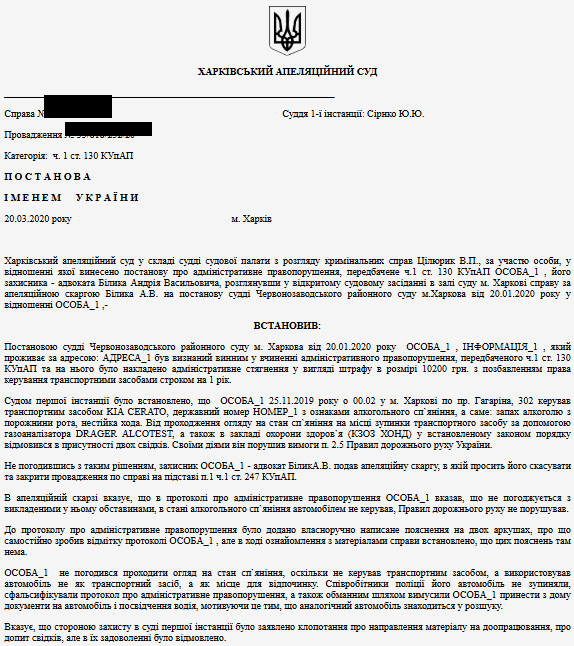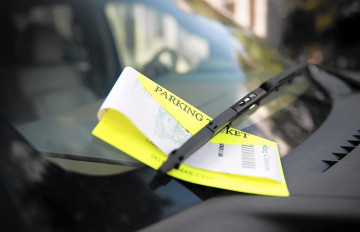My name is Andriy Bilyk, I am a lawyer from Gdansk, Poland. I have many years of experience and deep knowledge of the legislative framework. I have worked "on different sides of the barricades", I know the work of the investigation (5 years of experience, 4 of which were involved in the investigation of road accidents).
Situation: On November 25, 2019, at 00:02 in Kharkiv, on Gagarin Avenue, 302, a man was driving a KIA CERATO, registration number NUMBER_1. During the vehicle stop, signs of alcohol intoxication were detected, such as the smell of alcohol from the mouth and unsteady gait. The man refused to undergo a sobriety test at the location of the vehicle stop using the DRAGER ALCOTEST gas analyzer, as well as in a medical institution (KZOOZ KHOND) in the legally established manner in the presence of two witnesses. These actions violated the requirements of item 2.5 of the Traffic Rules of Ukraine.
Decision of the first instance court: The first instance court found the man guilty of violating traffic rules, stating that refusing to undergo a sobriety test is a violation that leads to responsibility.
Appeal: Dissatisfied with the decision of the first instance court, the defendant's lawyer, Bilyk A.V., filed an appeal. In the appeal, he asks to cancel the decision of the first instance court and close the case based on paragraph 1 of part 1 of Article 247 of the Code of Administrative Offenses (CAO).
Defense Arguments:
- Disagreement with the case circumstances: In the protocol of the administrative offense, the person indicated that he disagreed with the circumstances stated. He claims that he was not driving the vehicle in a state of intoxication and did not violate the traffic rules.
- Absence of handwritten explanations: Handwritten explanations from the person, written on two sheets, were attached to the protocol of the administrative offense. However, upon reviewing the case materials, it was found that these explanations were not included, which raises doubts about the accuracy of the protocol.
- Incorrect interpretation of events: The person disagreed with the claim that he was driving the vehicle in a state of intoxication. He explained that he was using the car not as a means of transportation, but as a place to rest, and that the police officers did not stop his car. The defense argues that the administrative offense protocol was fabricated.
- Unjustified demands for documents: The defense also argues that the police demanded from the person documents for the vehicle and a driver's license, claiming that a similar vehicle was being searched. These demands were unfounded, and the process was conducted unlawfully.
- Failure to comply with defense requests: The defense attorney indicates that during the first instance court hearing, a motion was made to send the materials for further work and to summon witnesses, but the court refused to grant these motions, which violated the right to a fair trial.
Defense objectives:
Cancel the decision of the first instance court.
Close the case due to insufficient evidence and violations of the client's rights during the preparation of the protocol.
Satisfy the motion for witness testimony and send the materials for further work.
Expected outcome:
Since the defense points to numerous procedural violations, the appellate court may cancel the decision of the first instance court, close the case, or return the materials for further work, which would ensure the proper application of the law and protection of the client's rights.
This case highlights the importance of proper documentation of circumstances in protocols, adherence to procedural norms during sobriety tests, and the need for an objective review of the case considering all evidence. Violations of these norms can lead to the cancellation of a court decision and the restoration of citizens' rights.


































